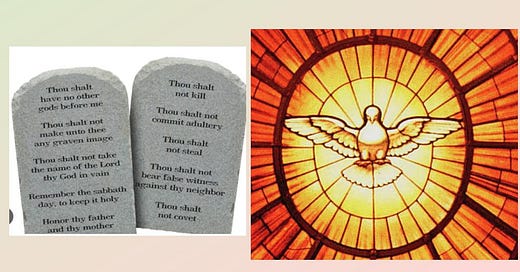Acts 2:1-11; 1 Cor 12:3-7,12-13; John 20:19-23
"When the day of Pentecost came, they were all together in the same place" (Acts 2:1). Jesus' disciples gathered there to celebrate the covenant at Sinai and the giving to the nation of Israel the "Torah" - the Law. According to Exodus, it was in the morning that the Lord came down upon Mount Sinai in fire (Ex. 19:18) and gave the people the Law. According to Jewish tradition, the voice of God took the form of fire, and each commandment uttered by God came to every Jew individually. Moreover, God's voice was split up into seventy languages so all the nations could understand.
"Suddenly a sound like the blowing of a violent wind came from heaven" (Acts 2:2). On the day all Israel celebrated the giving of the Law, God chose to send the Holy Spirit upon the Church. The covenant at Mount Sinai and the giving of the Law established a chosen nation: "You shall be to me a kingdom of priests and a holy people" (Ex. 19:6). The New Covenant established at the Last Supper and the outpouring of the Holy Spirit creates a new people of God: "But you are a chosen people, a royal priesthood, a holy nation, God’s special possession, that you may declare the praises of him who called you out of darkness into his wonderful light” (1 Pet. 2:9).
God's law and the Holy Spirit are brought together in the prophecies of Jeremiah and Ezekiel. Without the Holy Spirit, we can not fulfill the requirements of God's Law. However, God solves our problem by promising to send His Spirit into our hearts. The Spirit will write God's law on our hearts and will enable us to keep the precepts of God (Jer. 31:33, Ezek. 36:27). The sound of a rushing mighty wind brings to mind the vision of the prophet Ezekiel about the revival of dry bones (Ezek 37:1-14). From the four winds, the Spirit of life comes and blows into the "corpses" symbolizing the whole house of Israel, and makes them alive again. Like Israel, we also need to be brought back to life from death caused by sin, and only God's Spirit can do it.
Today's outpouring of the Holy Spirit is the fulfillment of Jesus' promise: "You will soon be baptized with the Holy Spirit" (Acts 1:5). It is also the fulfillment of Joel's prophecy about the last days. In the past, the gift of the Spirit was reserved only for certain people called by God to fulfill a special mission. For example, Moses was called to lead the people of Israel to freedom, and the prophets were called to proclaim God’s word. Today this gift is given to everyone, men and women, young and old, free and slaves (Acts 2:17-18, Joel 3:1-2). As Saint Paul pointed out: “There is neither Jew nor Gentile, neither slave nor free, nor is there male and female, for you are all one in Christ Jesus” (Gal. 3:28).
The gift of the Holy Spirit that we receive in the sacrament of baptism makes us God's children through adoption (see Gal 4: 6). The Spirit gives us the courage to confess that only Jesus is the Lord of history of the world and our lives. He also endows us with special gifts to build a Christian community (see 1 Cor. 12). Finally, the Spirit of God pours into our hearts His fruits that make our lifestyle different from what we see in the world. Instead of gratifying the desires of the flesh, we walk by the Spirit (Gal. 5:16).
Finally, with the outpouring of the Holy Spirit, the Church begins her evangelizing activity. "When the Holy Spirit descends upon you, you shall be my witnesses (...) to the ends of the earth" (Acts 1:8). The list of nations to which the early Church announces the Gospel embraces the whole world known to Saint Luke. Every nation has the opportunity to hear the Gospel in its own language. In this way, a new humanity is being established, the Church of God and the Holy Spirit is the protagonist of this mission.




